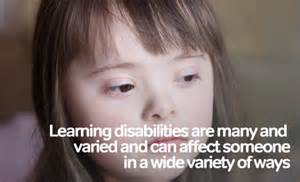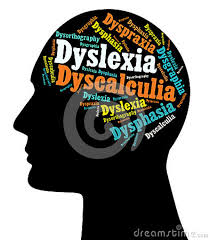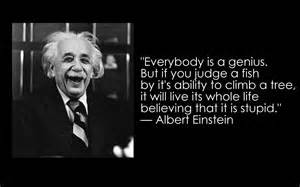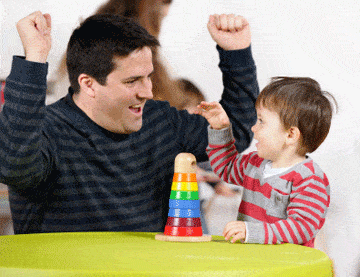The simplest way to explain learning disabilities is to say they are an entire classification of behaviors and functions that prevent learning in a “typical” way. Learning difficulties impact a person and make the learning experience difficult for a host of factors from many different areas of life. When these types of issues are not explained by developmental or neurological disorders, or by vision or hearing loss, or motor skill disorders, but they significantly interfere with a child’s academic achievement or activities of daily living, then a diagnosis of learning disability follows.
Typically, when a child shows persistent difficult learning how to read, or write or in mathematical reasoning during formal years of schooling, they are suffering from a learning disability. They may demonstrate symptoms such as slow or effortful reading, poor written expression with little or no clarity, difficulties remembering facts, or inaccurate mathematical reasoning. Their testing shows difficulties in academic skills of various types, and they present a range of scores that are well below average.
Most learning disabilities are diagnosed when a child has been in school for a year or two. If a child shows persistent difficulty in academic skills such as struggling to remember number facts or mathematical reasoning, inaccurate or slow reading even with great effort, or a tough time clearly expressing themselves in writing, they are more than likely dealing with some type of learning disability. There are some learning disabilities, however that manifest themselves earlier on in a youngster’s life.
Experts in developmental studies tell us that there are age appropriate times for certain achievements to occur. Babies are expected to begin walking at a targeted time in their development. The same can be said for showing that they understand what is being said or for having the motor skills and ability to turn themselves over independently. These time-sensitive achievements are called milestones. When developmental tasks fall significantly outside the range given to developmental milestones, this could be an indication of some type of learning disability.
Although there are a lot of things we already know about learning disabilities, as neuroscience continues to expand its research, we are learning more about them all the time. There still is much to learn and perhaps one of the best places to start is to walk a mile in the shoes of a child who experiences a learning disability.
Here are 13 things kids with learning disabilities would like you to know:
1. We are not our disorder
This is facing the problem square on, right from the start. Having a disorder is one component of a person, and must not be considered more than one single component. So often, people allow the disorder to take on what seems like a life of its own in which it takes shape and hold of not only the person with the disorder, but that person’s loved ones as well. In other words, many times, people allow disorders to take over and control everything about that person entirely.
Most likely, this is because of all the other emotions that attach themselves to the situation, strong, negative emotions such as frustration, anger and fear. Once these heavy-duty emotions take over, the road back is hard to find. It serves everyone well to be able to keep it all in proportion even if that means taking a step back and letting go of something we feel may be overwhelming.
2. Our difficulties aren’t anyone’s fault
Of course, it is not a good thing to blame anyone or to treat a kid with a learning disability like they’re doing anything wrong, but it is also just as important to make sure as a parent to not blame themselves. Learning disabilities are disorders like diabetes, acne or any other. As such, it can be worked with and its negative effects dealt with and lessened with proper attention and care. Reminding ourselves it is not anyone’s fault is a great way to remember that nobody wins if we look for someone or something to blame.
3. Our feelings count too
Having a learning disability does not in any way connect to any type of emotional disability or delay. Ignoring a child’s emotional well-being is detrimental. This applies not only from other children or teachers who ridicule and respond negativity to them in school, but more importantly by siblings and even parents, or caregivers at home. If anything, they are more emotionally vulnerable and in a position to be scarred for life emotionally by the harsh way they are treated.
4. Yelling or punishments won’t makes us learn any faster
Although we may not yet fully understand the connection between the two, anger seems to follow frustration quite often. And as caring parents who want to see their children excel, they sometimes let our disappointment and frustration in watching them struggle. If they let their feelings get the best of them and lose sight of the one who is really feeling the effects, they may give into our anger and actually try to strong arm the outcome they would prefer to see.
Needless to say, this would be a total lose-lose scenario and only make things worse all the way around.
5. We’re not doing this to make you mad
This follows closely on the heels of yelling and punishments because when parents do this, it is very likely that their child will feel as if their parents believe their lack of success is intentional and like they are holding them responsible not only for the lack of progress they are making, but also for doing it on purpose. Talk about carrying a heavy load! As adults, we need to stand back and again, realize who it is that is struggling here and offer a way to support, not tear down further.
6. We’re still kids, so give us a break
Hearing this means that parents are willing to step outside ourselves as parents or grownups even further and realize that to a child, it may not really be all that important in the first place. This is extremely important – it follows the old saying about ‘walking a mile in another person’s shoes.’ Although it may be a struggle for a child to try and keep up academically, they are still just a kid and sometimes (and this is in no way a bad thing) it may not seem all that devastating until adults make it that devastating.
7. Be patient, some things may take us longer to learn
This is not an inability. So with patience and repetition, many times those who know how to work with this specialized population often move mountains. They may move slowly, but we know that slow and steady often times wins the race. Patience is key to helping a child become confident in their abilities, especially if they are compromised in some way.
8. We’re just regular kids deep down
All children need to develop a sense of belonging, stability and esteem in order to develop into healthy, productive adults. Having a learning disability doesn’t change that in any way other than possibly to make it even more important because of negatives that are flung at the child like targeted missiles. Yet, most people tend to behave differently toward a child with learning disability. Finding a mid-point, a type of balance and normalcy, is critical to helping a child develop and maintain healthy habits.
9. Little acomplishments mean a lot to us
Keeping the lens of the other person’s shoes in place, it is not a far leap to realize that what may seem like no big deal to adults, can be a major accomplishment to a child, especially when it is a struggle. By noticing little accomplishments and molding them, parents help create bigger, greater accomplishments and there may be nowhere to witness this more so than with a child with learning disabilities. Make a big thing out of little accomplishments and watch in amazement over what follows.
10. If you believe we will succeed, then we will too
Children with learning disabilities are predestined for much more rejection and frustration in their lives than most. But, if they see that those people who matter most to them haven’t given up hope and have a positive outlook toward life’s challenges, they too, will pick up that winning attitude and stay motivated even in the face of adversity. Model the type of determination and grit that you know your child is going to benefit from throughout their life.
11. Reward us with gifts or praise, even for little things
Rewards don’t have to be costly. Sometimes a pat on the back means as much, if not more, as any gift might. Since success isn’t something that comes very frequently to children with disabilities, genuine, heartfelt praise is worth its weight in gold. The trick is to make sure it is genuinely from the heart, and make sure you don’t wait for what you might consider a major event. Remember how important little accomplishments are. Honor those events, even the little ones, because those little ones matter … BIG TIME.
12. Don’t give up on us
When things are harder for us, the tendency to give up is greater. This applies with children who have learning disabilities even more because they are more likely to face difficulties and failures in every day events than others do. Teaching tenacity and determination and modeling how to fall down and get back up again, helps a child develop resilience, something they will benefit from tremendously throughout their lives.
13. Pets can be super helpful for us
New studies can be found all the time, that tout the praises of how therapeutic a pet can be. This holds true for children with disabilities as well. From pleasure in friendship and companionship, to the physical benefits of touch in petting and holding a dog or cat, to the esteem building and overall sense of well-being pets bring, it is not surprising to learn about the successful statistics accompanying pets with children with disabilities, including learning disabilities.
Featured photo credit: Pixabay via pixabay.com


















































